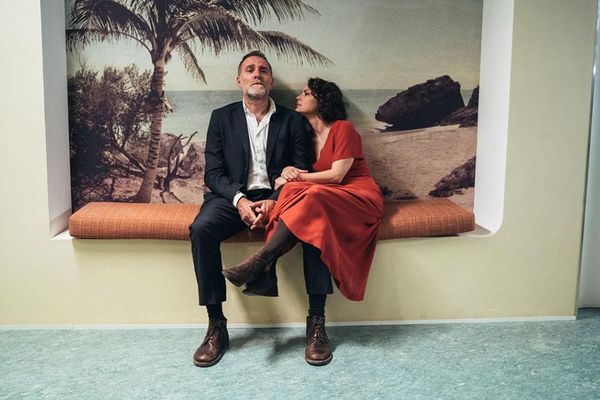Eye For Film >> Movies >> Feeling Better (2024) Film Review
Feeling Better
Reviewed by: Amber Wilkinson

A crowd-pleasing sweep and quirky verve bring energy to Valerio Mastandrea’s consideration of life in hospital limbo, which opened Venice’s Orizzonti section. It comes at the issue from the perspective of the souls of the coma patients hooked up to the various machines, who roam the corridors as they wait for life or death to claim them. While the end result doesn’t fully deliver on its excellent premise, being a little too light of touch, heavy on montage and spare in its scripting, this is nevertheless one of the more accessible cinematic takes on existentialism.
The bearded Mastandrea, who has an enjoyably crumpled look, with an earring that suggests the edge of something more mischievous, takes centrestage as an unnamed bloke who has been on the wards of the hospital for quite a while. Long enough, to form a friendship with two other coma souls, a taciturn Proust translator (Claudia Della Seta), who has been there even longer than he has, and a yellow sou'westered younger bloke (Lino Mustella).
When the trio aren’t attending various funerals, Mastrandrea’s character seems to enjoy soaking up the energy of the living, spending his days watching kids get PE coaching or generally enjoying societal gossip. In short, life is comfortable because, essentially, it is uneventful. That is until the arrival of a feisty younger woman (Dolores Fonzi), who catches his eye.
Romance is on the cards and it’s here that, despite winning performances from Mastrandrea and Fonzi, the script begins to struggle. The problem for the characters lies in the fact that, if they recover, they have no memory of what has gone before, making commitment even more bittersweet than usual. It’s an interesting idea but Mastrandrea struggles to exploit it.
More dialogue between the central pairing would help but the writer/director and his co-writer Enrico Audenino replace the spots where interaction should lie with extraneous plot developments and montage. Inventive camerawork from Guido Michelotti, including some impressive overhead shots, helps lift the film out of the everyday, but it could use more emotional ballast. A swimming pool sequence, while visually pleasant, can never deliver the intensity of a few well-crafted words.
One thing Mastrandrea doesn’t lack is a sense of fun, noticeable right from the film’s flowing opening sequence, which sees his character take an unusual trip back to his own bedside, to the employment of the hurricanes that blow up every time a death occurs. He may dig that deep into matters of life and death but at least he encourages us to try to make the leap.
Reviewed on: 28 Aug 2024















